
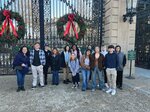
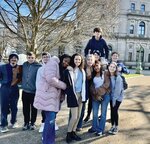



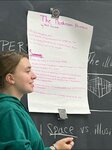
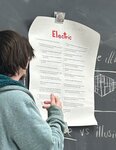
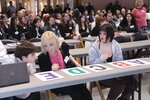

Johnston High School students are not likely to know the name Frank Lenox, but rest assured that teachers Debby Smyth and Kerry Murphy have been in contact with him since the beginning of the academic year.
Lenox, a physics teacher at East Greenwich High School, is the executive director of the Rhode Island Academic Decathlon, a day-long competition that will be held Sunday, March 3 at Bryant University.
The Johnston team is among 15 vying to represent the state in the worldwide competition, to be held April 25-26 in Pittsburgh, Pennsylvania. In addition, team members are competing for individual medals within three divisions: Honors, made up of students with 3.75–4.00 GPA, Scholastic (3.00–3.74 GPA), and Varsity (0.00–2.99 GPA).
That all sounds highly numbers-driven, which it is. However, as Lenox has experienced as coach of the East Greenwich team for 25 years, the decathlon does more than shine a light on the best and brightest.
Johnston’s Competitors
The Johnston team has consistently been a top contender in the state, missing first place by less than 20 points out of more than 30,000.
“I really enjoyed watching the students come together as a team this year,” said Johnston’s Academic Decathlon Coach and Business Teacher Debra Smyth (she also serves as DECA Advisor and Class of 2024 Co Advisor). “Our captain, Cameron Ferrara, really took the reins and established what I believe to be a winning team!”
This year’s Johnston team is made up of Captain Cameron Ferrara, Tyler Buote, Caroline Pesenecker, Logan Brennan, Neko Mahony, Janelle Nunez, Sofia China, Elliot Cortesi, Arianna Dandy, Gianna Orozco, Sophia Finegan, Robert Graham, Jasmin Guerrero, Jonas Littlefield and Connor Niles.
“Coaching Decathlon provides an opportunity to get to know students in a different setting,” said fellow Johnston AD Coach, Johnston Senior High School Art Teacher and Fine Arts Co-Chairperson, Kerry L. Murphy. “We delve in — deeply into content without class time constraints. I am always amazed that so many members of our team start rich conversations when it’s the scheduled time to leave. We stay later than scheduled on most days.”
Murphy’s often amazed at the young minds that are drawn to the competition.
“They ask wonderful open-ended questions like, ‘What life advice would you offer?’ We have outstanding people on our team. They are a curious and fun bunch of young adults!”
“As coaches, Debbie and I work closely with the captains each year to plan a field trip that supports the annual theme,” Murphy explained. “This year we decided to visit The Breakers for an underground tour that brought our discussions of Technology and Humanity to new heights! It took quite a bit to organize the tour for such a large group, but The Preservation Society of Newport County bent over backwards to assist us in creating a memorable experience for our team.”
The captain may be the leader, but each student is expected to step up during the competition.
“We encourage leadership in all our team members,” Murphy said. “Students regularly facilitate learning using diverse strategies. Literature study involves pairs of students discussing short stories and leading group discussions. Everyone is involved in presenting about selected artworks. Students whom are strong in a particular discipline create content to share on Google Classroom as well as in meetings. Our members have become stronger communicators in front of our eyes, and that’s a life-enriching skill set!”
Get Them Motivated
In a recent interview, Lenox was asked how he motivates kids to take on extra academic work when they feel they get enough of it in school.
“Students who want to continue their education at the college level are under a lot of pressure to distinguish themselves from their peers, in particular ‘extracurriculars’ that help them stand out in the application process,” he answered in an email.
“AD provides this opportunity, but it requires commitment. Rather than listing 10 different activities, colleges are looking for a commitment to 2 or 3 activities and to excel. Earning a position on the AD team shows commitment. The best part is that students have 10 different areas to display,” he said.
While aspects of the decathlon correlate with coursework, such as math, essay, and social sciences, much of the competition draws on skills and knowledge outside of the curriculum. The speech is frequently cited by students as the most challenging part of the competition. Competitors deliver a prepared and an impromptu speech before a panel of volunteer judges. There is also an interview component where volunteers judge performance.
Yet another component of the event, the super quiz, is outside the high school curriculum. The quiz, conducted in an auditorium setting with spectators, is the final event and based on the overarching theme of the competition. Reading materials, as well as tests in subjects like music and art, may incorporate questions relative to the theme.
“The year's theme, Technology and Humanity, comes with the explosion of AI (artificial intelligence) — mostly ChatGPT,” said Lenox. “While many students are comfortable with the 'technology' piece, the 'humanity' element is something they have a lot to learn about. There is a balancing act between the two, and it is interesting to see students trying to find that balance.”
How It Started In RI
The history of the Academic Decathlon in Rhode Island dates back to 1983. Fifteen years earlier, the concept of an academic contest based on a series of competitions in academic disciplines took root in California under the direction of Dr. Robert Peterson. As the decathlon caught on, Peterson looked to introduce more and more states to the event. Invitations were sent to individual schools, asking them to send a team to the national competition even if they were located in states with no state competition.
Bishop Hendricken High School followed up on the invitation in the spring of 1983, returning with several individual medals. The news was the catalyst of the formation of a group seeking to create a state academic decathlon. Representatives from public, private and parochial schools, teacher unions, school organizations, corporations and legislators formed a board of directors, and by the start of the academic year in 1983 more than 30 schools were preparing for a December competition that year.
Over the decades, RI Academic Decathlon has hosted the national competition on two occasions, with events held in Providence involving more than 50 teams from across the country and several foreign teams. This year’s United States Academic Decathlon will be held in Pittsburgh. And as has been the practice since the state organization was founded, the state winner will be granted sufficient funds to make the trip to the nationals, albeit one year it was held in Hawaii and another in Alaska.
Prospects of traveling may be the allure of the decathlon for some, but it’s hardly enough to get students to hit the books after a full day of classes.
The most daunting aspect of coaching from Lenox’s perspective is pulling the team together.
“What is the toughest thing about coaching an academic team, especially when the teams are designed to be inclusive of students with varying skills?” Lenox asked. “Students in the Honors and Scholastic division are naturally drawn to AD. Varsity students, on the other hand, need some incentive to commit to AD. Each one is different and it takes time to learn what interests them. Needless to say, the team is incomplete without them.”
Editor’s Note: Johnston Sun Rise Editor Rory Schuler contributed to this report.
Comments
No comments on this item Please log in to comment by clicking here